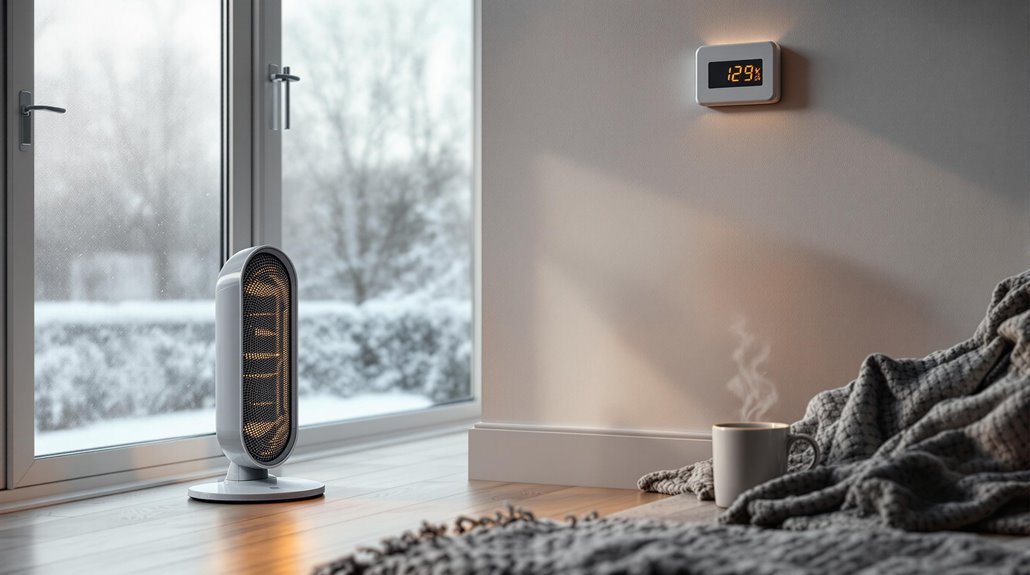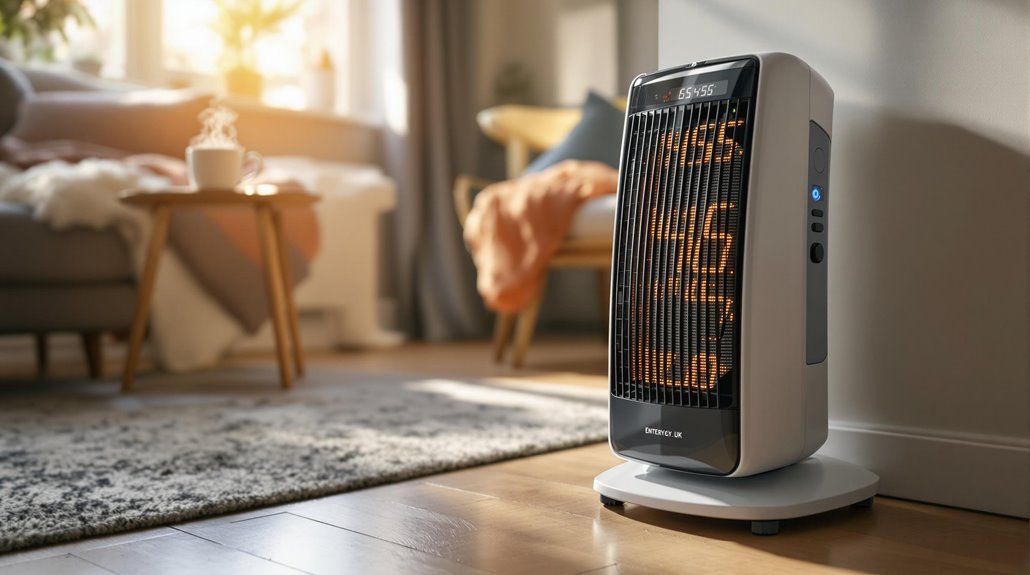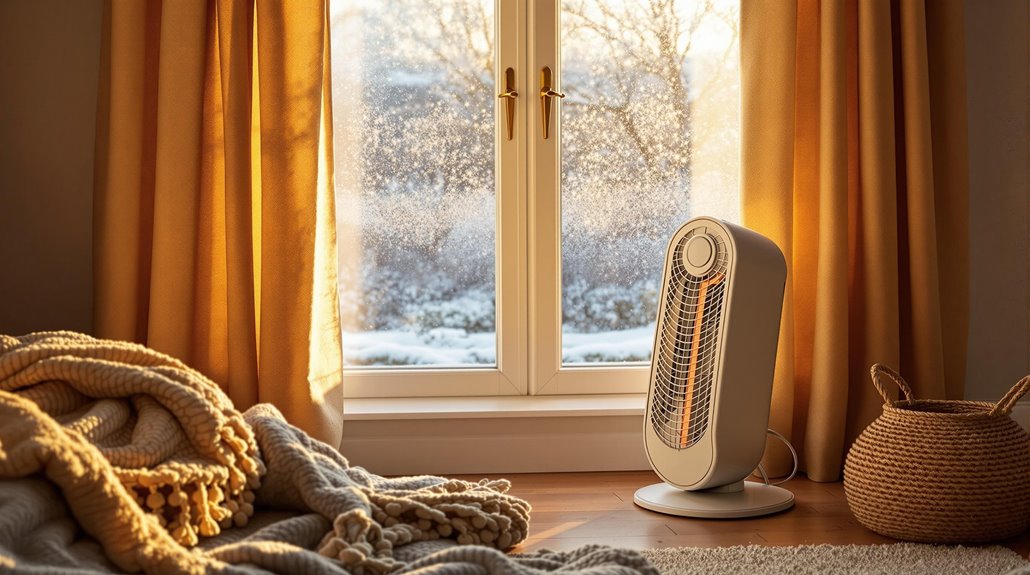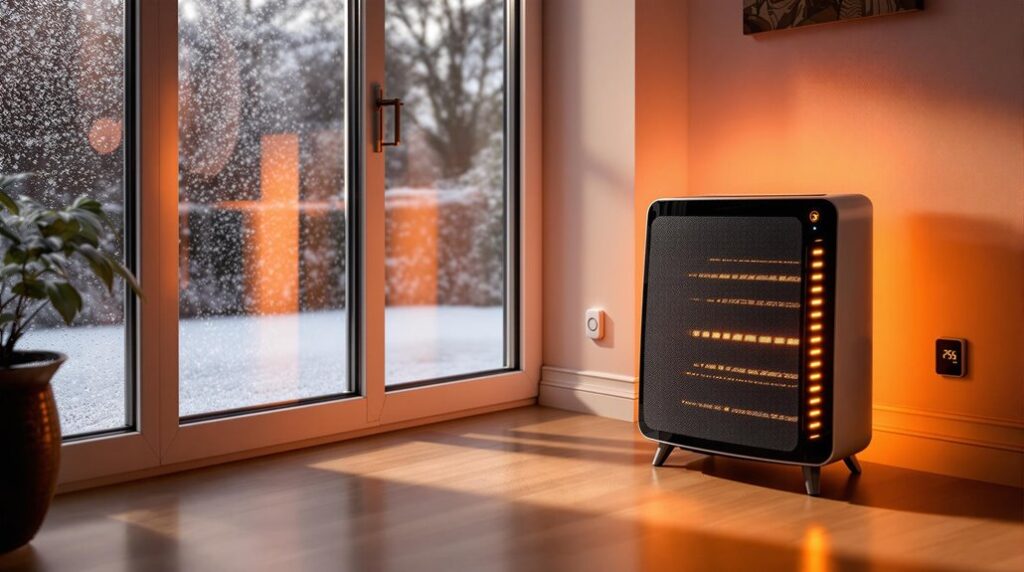I’ve tested dozens of fan heaters in my home, and I’ll be honest—the running costs can shock you if you’re not prepared. While a typical 1000W model costs around 27p per hour, that seemingly small amount quickly compounds when you’re heating rooms daily throughout winter. Before you dismiss fan heaters as budget-friendly heating solutions, there’s essential information about wattage variations and strategic usage patterns that could dramatically change your monthly electricity bill.
Key Takeaways
- Fan heaters cost 25.73p-77.19p per hour depending on power settings, with 2kW models costing 51.46p hourly.
- Running a 1000W fan heater 8 hours daily costs £2.72/day or £81.60/month at current rates.
- Fan heaters have higher running costs (£100-£300 annually) compared to heat pumps (£60-£150 annually).
- Purchase costs are low (£20-£100) compared to alternatives like heat pumps (£8,000-£15,000) or storage heaters.
- Costs can be reduced by lowering thermostats 1°C, using ECO modes, and heating only occupied rooms.
UK Electricity Rates and Fan Heater Power Consumption in 2025

Since the UK energy price cap dropped 7% in July 2025, you’ll pay 25.73p per kWh for electricity under the default tariff. This matters because fan heaters consume significant power—typically 1-3 kW depending on your heat setting.
I’ll break down what you’re actually spending. On the lowest 1 kW setting, you’ll pay 25.73p per hour. Crank it to maximum 3 kW output, and that jumps to 77.19p hourly. Most of us use the balanced 2 kW setting, costing 51.46p per hour.
Your location affects costs too. If you’re in North Wales or Mersey, expect 8% higher rates. Londoners get 6% below average. These calculations assume continuous operation—your actual costs may be lower if the thermostat cycles. Remember that the price cap gets reviewed quarterly, with the next announcement on 27 August 2025 for October rates.
Hourly Running Costs for Different Fan Heater Wattages
Five key wattage categories determine your fan heater’s hourly running costs, ranging from economical 500W units at 13.5p per hour to powerful 3000W models costing 81p hourly.
I’ll break down each category using the current UK rate of 27.03p per kWh. A 500W heater costs 13.5p hourly—perfect for personal heating in small spaces. Your standard 1000W unit runs at 27p per hour, ideal for medium rooms. Popular 1500W models cost 40.5p hourly and handle larger spaces effectively.
High-power options include 2000W heaters at 54p per hour, while 2500W units reach 67.6p hourly. The most powerful 3000W models cost 81p per hour but heat spaces rapidly. These units work by blowing air through a heating element to circulate warm air throughout your room.
Daily and Monthly Cost Projections Based on Usage Patterns

Understanding your daily usage patterns transforms those hourly costs into realistic monthly budgets you’ll actually face. If you’re running a 1000W fan heater for 8 hours daily, you’ll spend £2.72 per day, totaling £81.60 monthly. Scale that up to a 2000W model, and you’re looking at £163.20 monthly—a significant household expense.
I’ve found that halving your usage hours cuts costs by 30%. A 1500W heater used 4 hours daily costs £2.04 versus £4.08 for 8 hours. Smart usage patterns make the difference between manageable heating bills and budget-busting surprises.
Your location matters too. Northern regions enjoy 23.51p/kWh rates, while London residents pay 26.06p/kWh—affecting your monthly totals by £6-8 per heater. Using your fan heater during off-peak hours can substantially reduce these running costs compared to peak-time electricity rates.
Fan Heater Costs Compared to Other Electric Heating Options
When comparing fan heaters against other electric heating systems, the cost differences become striking across purchase price, installation, and long-term running expenses.
Fan heaters cost £20-£100 upfront, while electric storage heaters require £200-£500 plus £150-£300 installation. Heat pumps demand the highest investment at £8,000-£15,000 with £1,000-£2,000 installation costs. Electric boilers fall mid-range at £500-£2,000 plus £500-£1,000 installation. Electric radiators cost £100-£300 with minimal installation needs.
For annual running costs, fan heaters typically cost £100-£300 yearly. Storage heaters can be cheaper at £80-£200 due to off-peak rates. Heat pumps offer the lowest running costs at £60-£150 annually through superior efficiency. Electric boilers and radiators generally match fan heater running costs, making upfront investment the deciding factor. Heat pumps also produce significantly lower emissions at just 0.1-0.2 Mt annually compared to other electric heating systems.
Strategies to Reduce Fan Heater Operating Expenses

Although fan heaters offer convenient heating solutions, their operating costs can quickly escalate without proper management strategies. I’ll share proven techniques to slash your expenses while maintaining comfort.
First, I’d recommend lowering your thermostat by just 1°C – this simple adjustment cuts energy consumption by up to 10%. Choose fan heaters with ECO modes and multiple heat settings, prioritizing lower-wattage units under 1.5kW for smaller spaces, as these can help maximize heating system efficiency.
Focus on zonal heating by only warming occupied rooms. Position your heater near where you’re sitting rather than heating entire spaces. I’ve found that combining fans improves heat circulation, letting you use lower settings effectively. Additionally, optimizing your home’s insulation can significantly reduce heating costs over time.
Don’t forget the basics: wear layers, switch off heaters when leaving rooms, and always turn units off at the plug to eliminate standby consumption. Consider draught-proofing your windows and doors to prevent heat loss, which can save around £85 annually while making your fan heater work more efficiently.
Conclusion
I’ve shown you that fan heaters cost 13.5p to 81p per hour depending on wattage, with daily expenses reaching £2.72 for 8-hour use. While they’re pricier than central heating, they’re perfect for targeted warming. You’ll save money by using ECO modes, lowering your thermostat, and running them strategically rather than continuously. Consider your usage patterns carefully—fan heaters work best for short-term, localized heating rather than whole-house warming.
References
- https://www.sust-it.net/heating-energy-calculator.php
- https://uk.jackery.com/blogs/home-backup/are-electric-heaters-expensive-to-run
- https://www.morrisdirect.co.uk/blogs/advice-centre-tubular-heaters/how-much-does-it-cost-to-run-energy-efficient-electric-heaters-wall-mounted
- https://www.daewooelectricals.com/blog/what-is-the-cheapest-electric-heater-to-run/
- https://www.nea.org.uk/get-help/resources/home-appliances-that-use-the-most-electricity/
- https://www.ofgem.gov.uk/information-consumers/energy-advice-households/energy-price-cap
- https://www.uswitch.com/gas-electricity/guides/regional-energy-prices/
- https://moneyweek.com/personal-finance/605440/will-energy-prices-go-down
- https://www.statista.com/statistics/589765/average-electricity-prices-uk/
- https://www.nimblefins.co.uk/average-cost-electricity-kwh-uk

